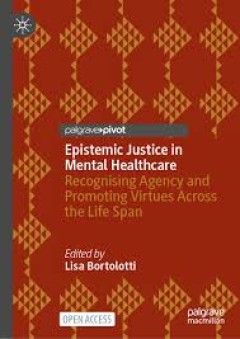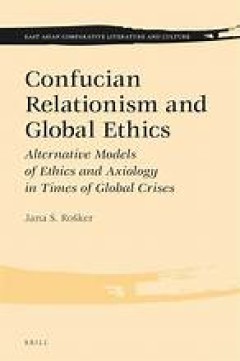Filter by

Transformational Ethics of Film = Thinking the Cinemakeover in the Film-Philo…
What is ‘the good’ of the film experience? And how does the budding field of ‘film as philosophy’ answer this question? Charting new routes for film ethics, Martin P. Rossouw develops a critical account of the transformational ethics at work within the ‘film as philosophy’ debate. Whenever philosophers claim that films can do philosophy, they also persistently put forward edifying p…
- Edition
- -
- ISBN/ISSN
- 9789004460874
- Collation
- 334 hlm; ill., lamp.,
- Series Title
- Value Inquiry Book Series, Volume: 365 Philosophy of Film, Volume: 365
- Call Number
- -

Epistemic Justice in Mental Healthcare = Recognising Agency and Promoting Vir…
This open access book explores epistemic justice in mental healthcare, bringing together perspectives from psychologists, psychiatrists, philosophers, activists, and lived experience researchers. Through eight chapters, authors identify threats to the agency of people who hear voices, experience depression, have psychotic symptoms, live with dementia, are diagnosed with personality disorders, a…
- Edition
- 1
- ISBN/ISSN
- 9783031688812
- Collation
- XVII, 160 hlm; ill., lamp.,
- Series Title
- -
- Call Number
- -

Disruptions, Diversity, and Ethics in Marketing: First International Conferen…
As the marketing landscape continues to evolve, posing fresh challenges for both academics and practitioners, this book explores contemporary marketing issues, trends, challenges, and opportunities. Featuring papers presented at the first annual International Conference on Advanced Marketing Practice (ICOAMP) held in Almería, Spain in 2024, this open access book covers a broad range of topics …
- Edition
- 1
- ISBN/ISSN
- 978-3-031-70488-8
- Collation
- XIV, 174
- Series Title
- -
- Call Number
- -

Confucian Relationism and Global Ethics
Environmental disasters, unequal distribution of resources, viral pandemics, and other types of trans-national disasters, are global crises that cannot be solved within the narrow framework of individual nation-states. They must be addressed through global cooperation and solidarity. Such strategies require intercultural dialog that goes beyond fashionable slogans and can lead to a truly equal …
- Edition
- -
- ISBN/ISSN
- 978-90-04-54626-4
- Collation
- oer.unej.ac.id
- Series Title
- East Asian Comparative Literature and Culture, Volume: 13
- Call Number
- -

Behind the Story: Ethical Readings of Qurʾānic Narratives
Behind the Story: Ethical Readings of Qurʾānic Narratives is a pivotal work that presents groundbreaking research on the Qurʾānic narrative as a literary genre with profound moral significance. It underscores the genre's integral role in shaping Islamic moral thought, as manifested in areas like Islamic law, theology, Sufism, politics, and art. The book offers insightful interpretations of …
- Edition
- Volume: 6
- ISBN/ISSN
- 978-90-04-68316-7
- Collation
- -
- Series Title
- -
- Call Number
- -

Informational Privacy for Service Design : An Ethical Framework for Designing…
This open access book equips designers with a deeper understanding of informational privacy, emphasizing why and how designers should design services that respect and enhance people’s privacy. The solution to these issues is more important and challenging in our globalized service and design landscape. In their quest to understand the rationale for privacy in service design, authors embarked …
- Edition
- 1
- ISBN/ISSN
- 9783031769269
- Collation
- X, 127 hlm,: ill, lamp;
- Series Title
- 52
- Call Number
- -

Research Ethics for Students in the Social Sciences
This open access textbook offers a practical guide into research ethics for undergraduate students in the social sciences. A step-by-step approach of the most viable issues, in-depth discussions of case histories and a variety of didactical tools will aid the student to grasp the issues at hand and help him or her develop strategies to deal with them. This book addresses problems and questions…
- Edition
- 1
- ISBN/ISSN
- 9783030484156
- Collation
- XVI, 287 ill; lamp
- Series Title
- -
- Call Number
- -

International Perspectives in Values-Based Mental Health Practice = Case Stud…
This open access book offers essential information on values-based practice (VBP): the clinical skills involved, teamwork and person-centered care, links between values and evidence, and the importance of partnerships in shared decision-making. Different cultures have different values; for example, partnership in decision-making looks very different, from the highly individualized perspective o…
- Edition
- 1
- ISBN/ISSN
- 9783030478520
- Collation
- XVIII, 436 hlm; ill., lamp.,
- Series Title
- -
- Call Number
- -

Positionierungen nachhaltigen Verhaltens am Arbeitsplatz = Eine rekonstruktiv…
In diesem Open-Access-Buch werden die Nachhaltigkeitspositionierungen von Angestellten im öffentlichen Dienst im Kontext organisationaler Nachhaltigkeitstransformationen untersucht. Mithilfe der Dokumentarischen Methode wird ein qualitativ-rekonstruktiver Ansatz verfolgt, um die vielschichtigen handlungsleitenden Orientierungen der Positionierungsfindung offenzulegen. Hierfür werden die Kompl…
- Edition
- 1
- ISBN/ISSN
- 9783658465827
- Collation
- XV, 242 hlm; ill., lamp.,
- Series Title
- -
- Call Number
- -

Charting Spiritual Care = The Emerging Role of Chaplaincy Records in Global H…
This open access volume is the first academic book on the controversial issue of including spiritual care in integrated electronic medical records (EMR). Based on an international study group comprising researchers from Europe (The Netherlands, Belgium and Switzerland), the United States, Canada, and Australia, this edited collection provides an overview of different charting practices and expe…
- Edition
- 1
- ISBN/ISSN
- 9783030470708
- Collation
- XV, 232 hlm; ill., lamp.,
- Series Title
- -
- Call Number
- -
 Computer Science, Information & General Works
Computer Science, Information & General Works  Philosophy & Psychology
Philosophy & Psychology  Religion
Religion  Social Sciences
Social Sciences  Language
Language  Pure Science
Pure Science  Applied Sciences
Applied Sciences  Art & Recreation
Art & Recreation  Literature
Literature  History & Geography
History & Geography